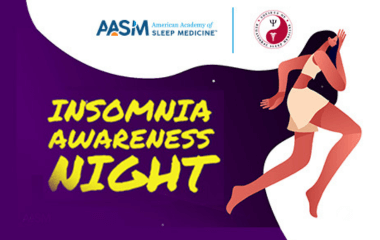DARIEN, IL – To drive awareness of chronic insomnia and its treatments, the American Academy of Sleep Medicine, in collaboration with the Society of Behavioral Sleep Medicine, will hold the 12th annual Insomnia Awareness Night on Friday, June 20, 2025 — the shortest night of the year.
“Insomnia is more than just a restless night, it’s a public health problem affecting millions of Americans,” said Emerson Wickwire, who has a doctorate in psychology and is on the board of directors of the AASM. “We want to empower individuals to recognize their symptoms, talk to their doctor, and understand that effective treatment options, including cognitive behavioral therapy for insomnia, can restore healthy sleep and improve quality of life.”
Symptoms and Impact of Chronic Insomnia
Chronic insomnia is a sleep disorder marked by difficulty falling asleep, staying asleep, or waking up earlier than desired, despite having ample opportunity to rest. To be classified as chronic, these sleep disruptions must occur at least three times per week and persist for a minimum of three months.
The effects of chronic insomnia go far beyond nighttime restlessness. Individuals often experience daytime fatigue, difficulty concentrating, low energy or motivation, and mood disturbances such as irritability, anxiety, or depression. Over time, the condition can take a serious toll on physical, mental, and emotional health, impairing overall well-being and daily functioning.
Chronic insomnia is also associated with an increased risk of developing more serious health problems, including depression, anxiety, substance use disorders, motor vehicle accidents, Alzheimer’s disease, and Type 2 diabetes.
According to a 2024 survey conducted by the American Academy of Sleep Medicine, approximately 12% of respondents reported being diagnosed with chronic insomnia, highlighting the widespread nature of this often-overlooked condition.
Recommended Treatment
The first-line recommended treatment for chronic insomnia is cognitive behavioral therapy for insomnia. CBT-I combines behavioral strategies, such as setting a consistent sleep schedule and getting out of bed when you are struggling to sleep, with cognitive strategies, such as replacing fears about sleeplessness with more helpful expectations. CBT-I recommendations are customized to address each patient’s individual needs and symptoms, and they can include stress reduction, relaxation, sleep hygiene education, and sleep schedule management.
“CBT-I is the gold standard for treating chronic insomnia because it targets the root causes of sleep difficulties rather than just masking symptoms,” said S. Justin Thomas, who has a doctorate in clinical health psychology and is president of the SBSM. “Unlike medications, which offer only temporary relief, CBT-I equips individuals with practical tools and long-term strategies to retrain the mind and body for healthy sleep. For many, the benefits of CBT-I are truly life-changing, restoring energy, improving mood, and enhancing overall quality of life.”
Insomnia Awareness Night
Since 2014, this nationwide event has been part of the AASM’s ongoing public education initiative to raise awareness and provide support for those living with chronic insomnia. To learn more about Insomnia Awareness Night, or for more information about sleep health and sleep disorders, visit SleepEducation.org.
If you’re having trouble falling asleep or staying asleep, talk to your doctor. They may refer you to a CBT-I professional or an AASM-accredited sleep center for help.
About the Survey
The American Academy of Sleep Medicine commissioned an online survey of 2,005 adults in the U.S. The overall margin of error fell within +/- 2 percentage points with a confidence interval of 95 percent. Fieldwork took place between May 16 and May 24, 2024, by Atomik Research, an independent market research agency. Results from the AASM Sleep Prioritization Survey are available in the AASM newsroom.
About the American Academy of Sleep Medicine
Established in 1975, the AASM advances sleep care and enhances sleep health to improve lives. The AASM has a combined membership of 12,000 accredited sleep centers and individuals, including physicians, scientists and other health care professionals who care for patients with sleep disorders. As the leader in the sleep field, the AASM sets standards and promotes excellence in sleep medicine health care, education and research.
About the Society of Behavioral Sleep Medicine
The Society of Behavioral Sleep Medicine (SBSM) is an interdisciplinary organization committed to advancing the scientific approach to studying the behavioral, psychological and physiological dimensions of sleep and sleep disorders and the application of this knowledge to the betterment of individuals and societies worldwide (https://www.behavioralsleep.org/).





